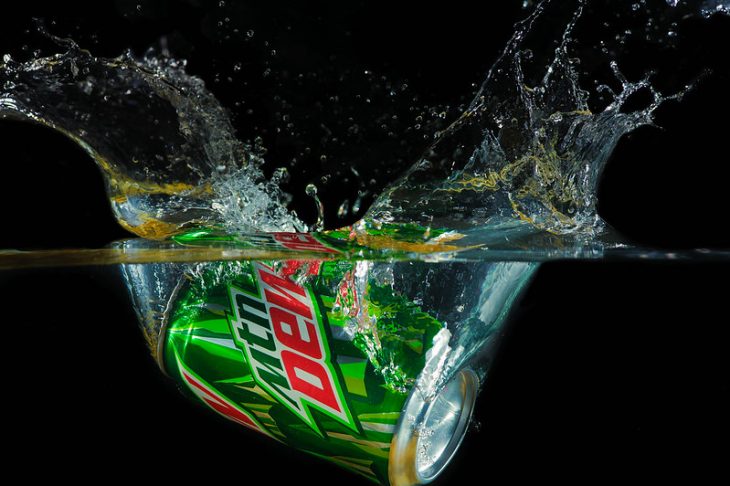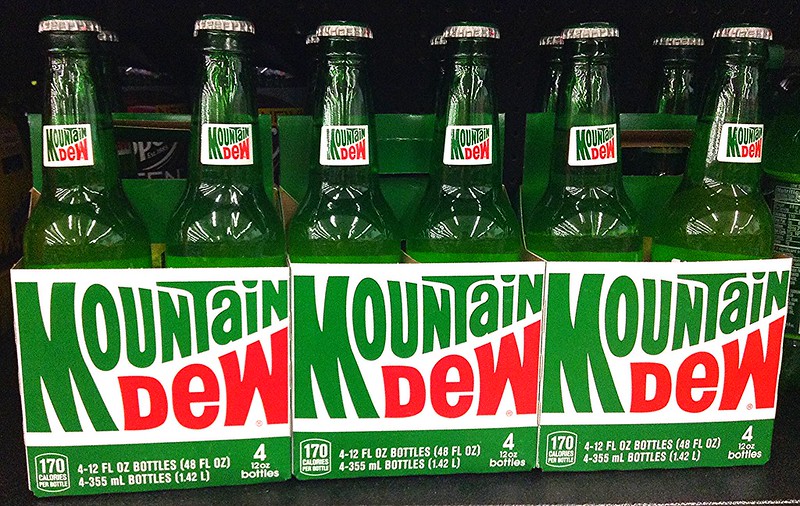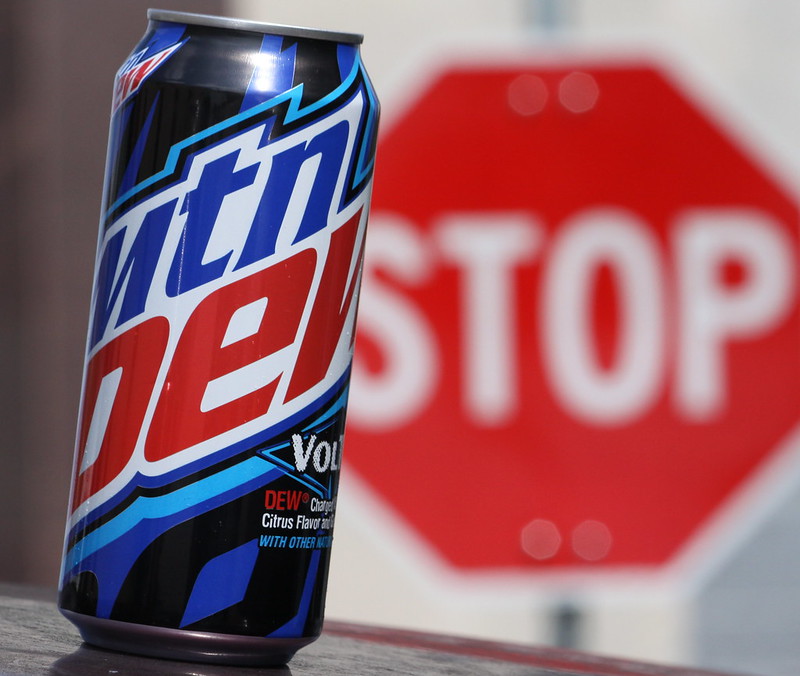
There’s no denying how much people love their Mountain Dew, yet many are still unaware of its ingredients, nutritional value, and other interesting facts about it. That’s why we’ve put together 18 must-know Mountain Dew nutrition facts that everyone should at least be familiar with. Join us as we take a walk down memory lane to explore the sweetness and goodness of this legendary drink!
High in Calories
Mountain Dew is a calorie-dense beverage, with a 12-ounce (355ml) serving containing approximately 170 calories. Consuming high-calorie beverages can contribute to weight gain if not balanced with physical activity and a healthy diet.
Significant Sugar Content
Mountain Dew contains a considerable amount of added sugar, with a 12-ounce serving providing around 46 grams. Excessive sugar consumption can lead to weight gain, tooth decay, and an increased risk of chronic diseases like type 2 diabetes and heart disease.
Caffeine Content
Mountain Dew is known for its caffeine content, which can provide a temporary energy boost. A 12-ounce serving contains approximately 54 milligrams of caffeine. While moderate caffeine consumption is considered safe for most people, excessive intake can lead to side effects such as jitteriness, increased heart rate, and sleep disturbances.
Presence of Artificial Colors
Mountain Dew contains artificial colors like Yellow 5 (Tartrazine) and Yellow 6 (Sunset Yellow), which give the drink its distinct hue. Some people may be sensitive to these additives and might experience allergic reactions or behavioral issues.
Limited Nutritional Value
Mountain Dew provides limited nutritional value. This is because it lacks essential vitamins, minerals, and other nutrients that can be found in healthier beverage options like water, milk, or fruit juice.
Sodium Content
A 12-ounce serving of Mountain Dew contains approximately 60 milligrams of sodium. While this amount is relatively low, it is essential to monitor your overall sodium intake, as excessive consumption can lead to high blood pressure and other health issues.
Mountain Dew Diet: A Lower-Calorie Alternative
Diet Mountain Dew is a lower-calorie alternative to the original. A 20-ounce serving of Diet Mountain Dew offers just 10 calories and no sugar. However, it is sweetened with artificial sweeteners like aspartame and acesulfame potassium, which some people may prefer to avoid.
Mountain Dew Code Red: A Fruit-Flavored Variation
Mountain Dew Code Red is a cherry-flavored variation of the original Mountain Dew. It has a similar nutritional profile as the original, with a 12-ounce serving providing 170 calories and 46 grams of sugar.
Mountain Dew Voltage: A Berry-Flavored Option
Mountain Dew Voltage is a raspberry-citrus-flavored version of the beverage. Its nutritional profile is comparable to the original Mountain Dew, with a 12-ounce serving containing 170 calories and 46 grams of sugar.
BVO: A Controversial Ingredient
Mountain Dew previously contained brominated vegetable oil (BVO), an ingredient used to stabilize flavors in some citrus-flavored beverages. BVO has been the subject of health concerns due to its potential to accumulate in body tissues and cause adverse effects. In response to consumer concerns, Mountain Dew’s parent company, PepsiCo, removed BVO from its products in 2014. However, the original Mountain Dew formula, which contains BVO, is still sometimes sold as the “Mountain Dew Throwback” beverage.
Mountain Dew Kickstart: An Energy Drink Hybrid
Mountain Dew Kickstart is a line of energy drinks that combines the familiar Mountain Dew flavor with fruit juice and added caffeine. While it may provide an energy boost, it also contains added sugars and artificial ingredients.
Mountain Dew Game Fuel: Designed for Gamers
Mountain Dew Game Fuel is a beverage marketed toward gamers, claiming to enhance alertness and accuracy during gameplay. It contains added caffeine, vitamins A and B, and theanine. While it may provide a temporary energy boost, it also contains added sugars and artificial ingredients.
Mountain Dew Zero Sugar: A No-Sugar Version
Mountain Dew Zero Sugar is a no-sugar alternative to the original beverage, containing zero calories and no added sugar. Like Diet Mountain Dew, it is sweetened with artificial sweeteners like aspartame and acesulfame potassium.
Mountain Dew Baja Blast: A Tropical Twist
Mountain Dew Baja Blast is a tropical lime-flavored variation of the beverage. Its nutritional profile is similar to the original Mountain Dew, with a 12-ounce serving providing 170 calories and 44 grams of sugar.
High Fructose Corn Syrup
Mountain Dew is sweetened with high fructose corn syrup (HFCS), a common sweetener in the United States. Some studies have linked HFCS consumption to obesity, diabetes, and heart disease, though more research is needed to understand the full extent of its health implications.
Citric Acid
Mountain Dew contains citric acid, an ingredient used to provide tartness and act as a preservative. Consuming beverages with phosphoric acid can contribute to the erosion of tooth enamel and promote the development of cavities.
Mountain Dew and Bone Health
Some studies have suggested a link between soft drink consumption, including Mountain Dew, and decreased bone mineral density. This may be due to the acid content or the displacement of calcium-rich beverages like milk in the diet.
The Importance of Moderation
While enjoying Mountain Dew occasionally is unlikely to cause significant harm, it’s essential to consume it in moderation as part of a balanced diet. Opting for healthier beverage choices like water, herbal tea, or unsweetened fruit juice can help support overall health and well-being.

More About Mountain Dew
Mountain Dew’s Origins
Mountain Dew was originally created in the 1940s by Barney and Ally Hartman, who intended it to be a mixer for whiskey. The name “Mountain Dew” is a slang term for moonshine.
Mountain Dew and the Environment
Mountain Dew’s parent company, PepsiCo, has made efforts to reduce the environmental impact of its products by improving packaging sustainability and reducing water and energy use in its manufacturing processes. However, it’s essential to consider the broader environmental impacts of beverage consumption, such as plastic waste and resource use, when making dietary choices.
Conclusion
All in all, Mountain Dew is certainly a timeless classic and one of the most beloved drinks around. Its bold flavors, delightful energy boost, and crave-worthy taste have kept people coming back for more. Next time you grab a can of this popular beverage, don’t forget to pay homage to its legacy by really savoring each sip!
Now that you know the essential nutrition facts about this classic carbonated drink, why not take advantage and make an informed decision when selecting your next sugary indulgence? Whether you love Mountain Dew or just want to know what it’s all about, we hope these 18 must-know nutrition facts have provided you with some much-needed insight into one of America’s favorites!
Was this page helpful?
Our commitment to delivering trustworthy and engaging content is at the heart of what we do. Each fact on our site is contributed by real users like you, bringing a wealth of diverse insights and information. To ensure the highest standards of accuracy and reliability, our dedicated editors meticulously review each submission. This process guarantees that the facts we share are not only fascinating but also credible. Trust in our commitment to quality and authenticity as you explore and learn with us.

